Strictly Personal
Buhari, Emefiele’s handshake across our heads, By Festus Adebayo
Published
1 year agoon
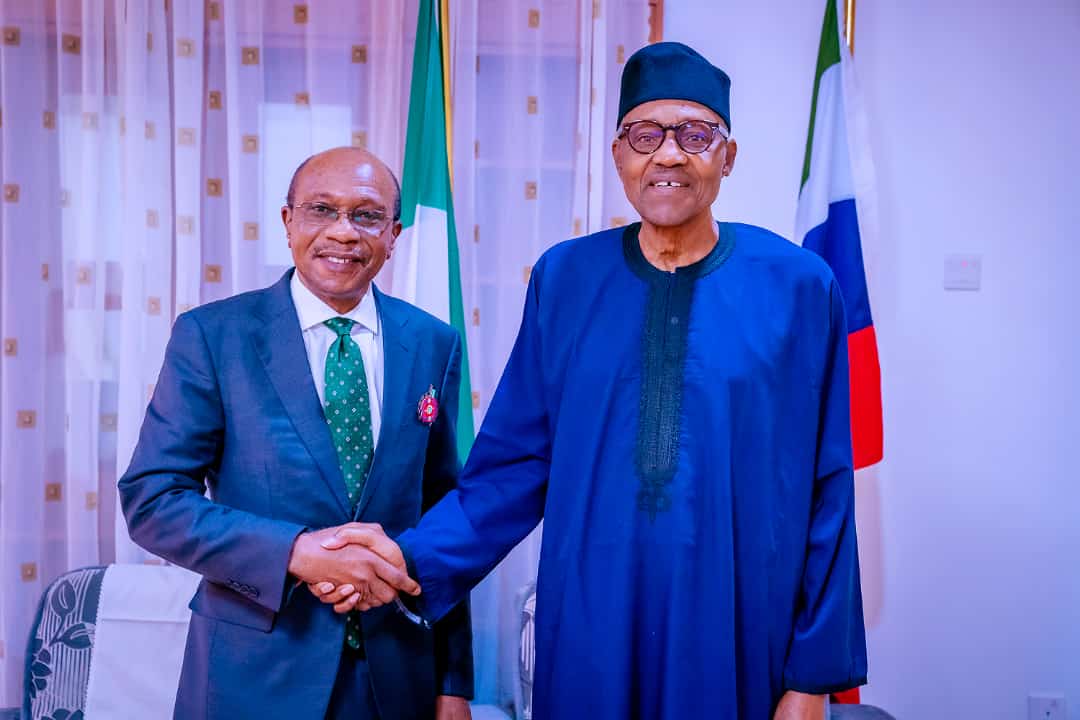
This week, there will be a stampede in Nigeria. Stampede for the new Nigerian currencies. The Central Bank of Nigeria (CBN’s) policy of currency exchange has been variously lauded for its power to purge the system of slush funds warehoused for election purposes. However, its symptom as a vengeful political weapon which manifests as preparations towards the January 31 expiration of old notes reach their crescendo, have revealed the rump of this very shoddy policy.
The new Naira notes are nowhere in circulation. They are however scattered at weekend party venues and in the warehouses of politicians. The currency change system is so inept that politicians are weaponizing its effeminacy, through commercial banks, as an opportunity to mop up the new notes of Godwin Emefiele, Nigeria’s ex-assumed fugitive Central Bank of Nigeria (CBN) Governor, known in underground circle as Meffy’s new notes. In Emefiele’s Nigeria, there is weird politics among functionaries of a government that is immersed in and is a victim of its own incompetence. It is the ordinary woman selling fish in the market and the poor who will suffer this weird politics being played between the taciturn megida – Nigeria’s President Muhamadu Buhari – and Meffy, his sidekick, as well as the strange birds which have made for themselves a comfortable nest in the inept system.
Did you see the picture that adorned the front pages of some Nigerian newspapers last Friday? It was that of Emefiele. He was locked in a hand-pumping pose with his principal, Muhammadu Buhari. In the photo, the duo was shawled in what appeared to be a slapstick, titivating session. It was one you would find among folks who had just won a million-dollar tombola. Or the unconscionable camaraderie during the signing of the Strategic Arms Limitation Talks (SALT). Or where a recipient had just been invested with a membership of the biology of Alfred Nobel, through being inducted into the highly prestigious Nobel hall of fame.
The said picture clearly disguised the infamy that undergirds it. Or the grits of what it innocuously advertised. Those days when cigarette smokers puffed at their sticks, in disdain of those who mocked them, Yoruba equalized the puffed smoke as akin to the smoker ensuring that a sparkle of fire flared over his enemies’ head – o gbe’na g’ori ota. That handshake shared similar unspoken victory paraphernalia with those smokers’ grandstanding. Enveloped together in this camaraderie at Aso Rock, apparently like clinking wine glass cups to mark a full denouement of a grisly drama, were the Chief of Staff to the president, Ibrahim Agboola Gambari, Borno governor, Babagana Zulum and Minister of Foreign Affairs, Geoffrey Onyeama.
That picture purely disguised the crises that signpost the life of Nigeria. Or the bedlam that is the country’s economy and finance. If you are a student of semiotics and are conversant with the politics of meaning in Nigeria’s journey to the 2023 election, the import and purport of Meffy and his boss’ kindergarten pose for a photo-op would dawn on you in its rawest manifestation. If you needed a perfect fit to that ancient emoji image conjured by the saying that Nero fiddled while Rome burns, look no further from this infamous photograph.
Why does a man who had just returned from “an annual leave” and is meeting his principal, ostensibly to brief him on what had transpired during his holiday abroad, need to pose for a public photograph with his boss? Why was the mood celebratory, with a convergence of the inner machine of Aso Rock giving the photo-op a life that is as large as a dinosaur’s? The reality oscillates in the firmament of the darkest minds of Nigeria’s I-don’t-care governance apparatus. It is an apparatus that preferences brackish politics at the expense of the people’s welfare.
A few kilometers from the Aso Villa where that celebration was taking place, Nigerians were gnashing their teeth in petrol queues. Nigeria is currently embroiled in one of the most grinding petroleum scarcity rituals of its existence, with government advertising an apparent lack of manhood over the matter. At petrol stations at the moment is a live dramatization of the chaos that Buhari will bequeath to the next administration.
If the DSS does it job as it should, Buhari and Meffy would, last Thursday, most probably not be lost in that miasma they wrongly saw as the celebration of their political enemies. They would most probably be busy finding solutions to the economic drift. Petrol stations are today where the greatest treason against a sitting government is committed without any scintilla of care in the world. The stations advertise Wole Soyinka’s season of anomie and a government without direction.
At petrol stations, people freely and openly singe this government’s flesh; a government they see as the worst in the history of Nigeria. Again, at petrol stations is where you will find the strongest manifestation of class in Nigeria. Nigerians who do not experience the dual tyranny of Buhari and Meffy and who know none of their joint pains go buy their fuel as high as N300 a liter while the ordinary Nigerians queue at major petroleum distribution marketers’ stalls in serpentine, multiple kilometer lines. They are in search of a commodity that is domiciled in the bowels of Nigerian soil. Gone are the days when petrol stations wait for government to announce price hike before advertising this on their meters. Today, in underscore of the effeminacy of the government in Abuja, various meter prices are advertised without any fear. It is where you will find out that there is no government, no governance but photo-ops.
When I see such governmental castration of fervor and ability as demonstrated by the bedlams at petrol stations, what my mind hovers over is that favourite South African short story of mine entitled The Dube Train. It was authored by Drum magazine journalist, Can Themba, one of the collectives of Apartheid journalists like Nat Nakassa, who blended journalism with creative writing. This they weaponized as social commentaries against the ills of the white government and the crass disconnect of government from the pains and pangs of the people.
In the said Themba story set in a busy train coach heading for Dube Town on a Monday morning, a woman is physically assaulted by a tout called tsotsi and the passengers say nothing. A woman then spanks the men “Lord, you call yourself men! You poltroons! You let a small ruffian insult you. Fancy, he grabs at a girl in front of you….you might be your daughter…if there were real men here, they’d pull him off and give him such a leathering he’d never sit down for a week.” The tout pulls a knife, stabs a man who nonetheless hauls him out of the train, to his death. The passengers winced, without a whimper. The ending that Themba gives the story is what fascinates me here and in which I find a corollary with the Nigerian situation under Buhari and Meffy: “it was just another incident in the morning Dube Train” as “the crowd is greedily relishing the thrilling episode.”
Like the passengers in that Dube Township train this Monday morning, Nigerians no longer bothered about the absence of governance in their lives. Indeed, they are relishing the grisly episode and waiting for the affliction to expire in May. With cost of living hitting the firmament and food prices a whiff off the cloud, the prayer is that Nigerians do not hit that macabre and astonishing narrative of what happened in the biblical chapter called the Kings. It is a ghoulish narrative of two Israelite mothers who, hungry and unable to endure the pangs, agreed to mutually devour their children for supper. It was a very challenging, governmentally rudderless time in the city of Samaria which was under siege and embroiled in an unprecedented food scarcity. This resulted in these mothers’ cannibalism. Already in Nigeria, the economy is pushing the people to Samaria. We witness the extreme of crimes that even criminologists find no corollary to in crime literature. Pastors are faking their own kidnaps so that they can extract illicit profit from their congregation; sons are killing their parents for rituals. It is like Samaria, here we come.
Yet, Meffy and his boss are sucking into the 2023 election politics with so much aplomb and Gothic pleasure. That picture may be saying all that with an unspoken magistracy of the power they think they wield. You ask how? All right. You will remember that since the president’s political party, the All Progressives Congress, (APC) concluded its party primary last year, throwing up a man who the presidency’s disdain and disavowal for were known to even babes and suckling, Aso Rock was said to have gone the route of its notorious ethnic politics? Is that still convoluted?
Godwin Emefiele was drafted into this odious rat race by the same cabal. That selfsame Aso Rock consort got depleted by one, with the passage of that media mogul who Meffy was pictured with in a sequestered and groveling posture. The consort, which held the key to the heart of the presidency, had been propelling him like a marionette since he became the CBN governor. It was the one that asked him to throw his hat into the ring of the APC presidential contest and was miffed that its lapdog lost to its adversary. This then should explain why Meffy was so audacious in his awkward quest for the presidency while he was yet the CBN governor. He was even so audacious as to sneak to his Ward 6 in the Ika South Local Government Area of Delta State, to register as a card-carrying APC member. This much was confirmed by Nduka Erikpume, chairman of his ward, who confirmed it to the press last year. This is in violation of Section 9 of the CBN Act, 2007, to wit that, “The Governor and the Deputy Governors shall devote the whole of their time to the service of the bank and while holding office shall not engage in any full or part-time employment or vocation whether remunerated or not…”
When this noxious ambition crumbled, like a dog in fruitless scamper after a mongrel, Meffy, defeated, wagged his tail cowardly and retreated into his cage. No sanction from the system for this impunity. And he lived happily ever thereafter.
Knowing that the overall boss lacks a mind of his own, but apprised of his disdain for the party fellow, the remnants of the cabal struck a deal with one of the contenders for the office of the president. If you are in doubt about this, ask Nyesom Wike. You remember the Rivers governor’s famous or infamous volley of diatribes last year against those who he alleged – and I paraphrase – “because someone in Aso Rock promised you presidency, you can look down on others!”? All right. Meffy is alleged to be in cahoots with these folks and, in street gossip, has benefitted this clan with billions of dollars through the duplicitous exchange rate policy. He is also rumoured to be inside the cocoon of the cabal’s ethnic politics. So, the role of Meffy, as the Chancellor of Exchequer, in this ethnic power expansionism, is to muzzle the party folk, money-wise, in the build-ups to the February 25 polls.
The drama against Meffy is thus a political rebound from the flank of the party folk, with the target of paying back the CBN governor in his own coins. The DSS is easily an anvil of this vendetta. It had filed an ex-parte application to have Meffy detained for what panned out to be the whole period of the elections, on allegations of fraud and terrorism financing. In the application, it claimed that preliminary investigation revealed that Emefiele was involved in acts of terrorism financing, fraudulent activities and involvement in economic crimes of national security dimension. While dismissing the application, the Federal High Court said it would not be stampeded into hounding “an innocent man” and subsequently issued an order restraining the DSS from “arresting, detaining or questioning” the CBN governor.
At the outset of this plan to get him arrested, and aware that there was an orchestrated plan to get him arrested by the DSS, Emefiele easily jumped on the presidential plane carrying his principal godfather to the US-Africa Leaders’ Summit in Washington DC which held between December 13 and 15, 2022. However, told that his assailants were still on the prowl, Emefiele turned self into a temporary fugitive, so much that while Buhari returned to Abuja a day after the conclusion of the summit, Meffy was nowhere to be found.
An online newspaper claimed that as he returned to Nigeria from his temporary exile last week Monday, a detachment of military police escorted him from the Abuja airport. “Emefiele… security is bigger than that of the President,” said the newspaper, a claim that is yet to be refuted.
However, while it is within his presidential power to take a “detractors, go to hell!” photograph with Emefiele, moral authority convicts Buhari for not at least attempting to investigate the pot-pourri of allegations against this financial sidekick of his. Never in the history of CBN governorship had any of its heads been totally enveloped by an odious and scandalous tarpaulin of financial malfeasances as this. While we may be eager to dismiss the allegation of financing terrorism against Meffy as trumped-up vendetta, allegations that Emefiele has humongous stakes in twelve banks are confounding and needed to be dispensed with. This is followed by similar allegation that he has turned the CBN into an Alaba market of Stone Age prebend exchanges where personal rents are haggled as they do in a fish market. But not Buhari. He doesn’t have a history of auditing his appointees for wrongdoings. He rather abets them by his weird silence.
Where then will this Emefiele grotesque drama end?
You may like
-
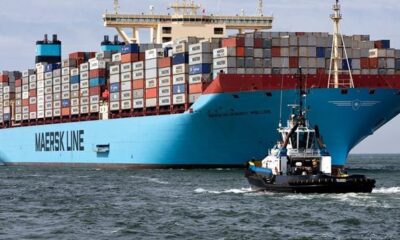

Nigeria loses $9.2 billion to foreign shipowners
-
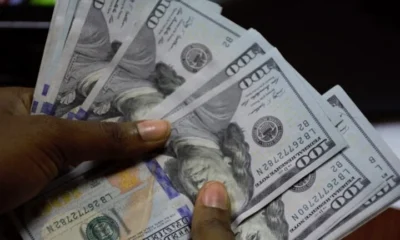

Nigeria wants managers for proposed $10 billion diaspora fund
-
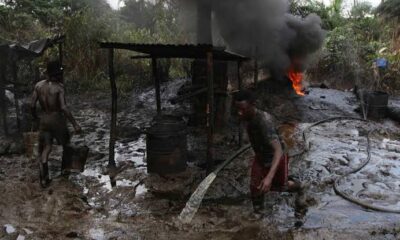

Nigeria loses N1.29trn annually to crude oil theft, vandalism— Reps Speaker
-


All my tough policy decisions are in Nigerians’ interest— Tinubu
-
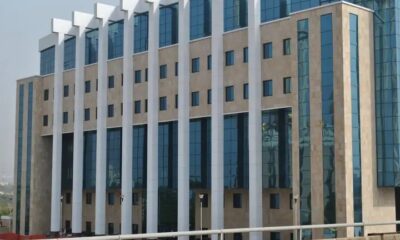

Nigerian oil regulator implements regional fuel standards
-


Nigeria’s NGX Group enters into strategic investment partnership with Ethiopian Securities Exchange
Strictly Personal
Air Peace, capitalism and national interest, By Dakuku Peterside
Published
2 weeks agoon
April 16, 2024
Nigerian corporate influence and that of the West continue to collide. The rationale is straightforward: whereas corporate activity in Europe and America is part of their larger local and foreign policy engagement, privately owned enterprises in Nigeria or commercial interests are not part of Nigeria’s foreign policy ecosystem, neither is there a strong culture of government support for privately owned enterprises’ expansion locally and internationally.
The relationship between Nigerian businesses and foreign policy is important to the national interest. When backing domestic Nigerian companies to compete on a worldwide scale, the government should see it as a lever to drive foreign policy, and national strategic interest, promote trade, enhance national security considerations, and minimize distortion in the domestic market as the foreign airlines were doing, boost GDP, create employment opportunities, and optimize corporate returns for the firms.
Admitted nations do not always interfere directly in their companies’ business and commercial dealings, and there are always exceptions. I can cite two areas of exception: military sales by companies because of their strategic implications and are, therefore, part of foreign and diplomatic policy and processes. The second is where the products or routes of a company have implications for foreign policy. Air Peace falls into the second category in the Lagos – London route.
Two events demonstrate an emerging trend that, if not checked, will disincentivize Nigerian firms from competing in the global marketplace. There are other notable examples, but I am using these two examples because they are very recent and ongoing, and they are typological representations of the need for Nigerian government backing and support for local companies that are playing in a very competitive international market dominated by big foreign companies whose governments are using all forms of foreign policies and diplomacy to support and sustain.
The first is Air Peace. It is the only Nigerian-owned aviation company playing globally and checkmating the dominance of foreign airlines. The most recent advance is the commencement of flights on the Lagos – London route. In Nigeria, foreign airlines are well-established and accustomed to a lack of rivalry, yet a free-market economy depends on the existence of competition. Nigeria has significantly larger airline profits per passenger than other comparable African nations. Insufficient competition has resulted in high ticket costs and poor service quality. It is precisely this jinx that Air Peace is attempting to break.
On March 30, 2024, Air Peace reciprocated the lopsided Bilateral Air Service Agreement, BASA, between Nigeria and the United Kingdom when the local airline began direct flight operations from Lagos to Gatwick Airport in London. This elicited several reactions from foreign airlines backed by their various sovereigns because of their strategic interest. A critical response is the commencement of a price war. Before the Air Peace entry, the price of international flight tickets on the Lagos-London route had soared to as much as N3.5 million for the economy ticket. However, after Air Peace introduced a return economy class ticket priced at N1.2 million, foreign carriers like British Airways, Virgin Atlantic, and Qatar Airways reduced their fares significantly to remain competitive.
In a price war, there is little the government can do. In an open-market competitive situation such as this, our government must not act in a manner that suggests it is antagonistic to foreign players and competitors. There must be an appearance of a level playing field. However, government owes Air Peace protection against foreign competitors backed by their home governments. This is in the overall interest of the Nigerian consumer of goods and services. Competition history in the airspace works where the Consumer Protection Authority in the host country is active. This is almost absent in Nigeria and it is a reason why foreign airlines have been arbitrary in pricing their tickets. Nigerian consumers are often at the mercy of these foreign firms who lack any vista of patriotism and are more inclined to protect the national interest of their governments and countries.
It would not be too much to expect Nigerian companies playing globally to benefit from the protection of the Nigerian government to limit influence peddling by foreign-owned companies. The success of Air Peace should enable a more competitive and sustainable market, allowing domestic players to grow their network and propel Nigeria to the forefront of international aviation.
The second is Proforce, a Nigerian-owned military hardware manufacturing firm active in Rwanda, Chad, Mali, Ghana, Niger, Burkina Faso, and South Sudan. Despite the growing capacity of Proforce in military hardware manufacturing, Nigeria entered two lopsided arrangements with two UAE firms to supply military equipment worth billions of dollars , respectively. Both deals are backed by the UAE government but executed by UAE firms.
These deals on a more extensive web are not unconnected with UAE’s national strategic interest. In pursuit of its strategic national interest, India is pushing Indian firms to supply military equipment to Nigeria. The Nigerian defence equipment market has seen weaker indigenous competitors driven out due to the combination of local manufacturers’ lack of competitive capacity and government patronage of Asian, European, and US firms in the defence equipment manufacturing sector. This is a misnomer and needs to be corrected.
Not only should our government be the primary customer of this firm if its products meet international standards, but it should also support and protect it from the harsh competitive realities of a challenging but strategic market directly linked to our national military procurement ecosystem. The ability to produce military hardware locally is significant to our defence strategy.
This firm and similar companies playing in this strategic defence area must be considered strategic and have a considerable place in Nigeria’s foreign policy calculations. Protecting Nigeria’s interests is the primary reason for our engagement in global diplomacy. The government must deliberately balance national interest with capacity and competence in military hardware purchases. It will not be too much to ask these foreign firms to partner with local companies so we can embed the technology transfer advantages.
Our government must create an environment that enables our local companies to compete globally and ply their trades in various countries. It should be part of the government’s overall economic, strategic growth agenda to identify areas or sectors in which Nigerian companies have a competitive advantage, especially in the sub-region and across Africa and support the companies in these sectors to advance and grow to dominate in the African region with a view to competing globally. Government support in the form of incentives such as competitive grants ,tax credit for consumers ,low-interest capital, patronage, G2G business, operational support, and diplomatic lobbying, amongst others, will alter the competitive landscape. Governments and key government agencies in the west retain the services of lobbying firms in pursuit of its strategic interest.
Nigerian firms’ competitiveness on a global scale can only be enhanced by the support of the Nigerian government. Foreign policy interests should be a key driver of Nigerian trade agreements. How does the Nigerian government support private companies to grow and compete globally? Is it intentionally mapping out growth areas and creating opportunities for Nigerian firms to maximize their potential? Is the government at the domestic level removing bottlenecks and impediments to private company growth, allowing a level playing field for these companies to compete with international companies?
Why is the government patronising foreign firms against local firms if their products are of similar value? Why are Nigerian consumers left to the hands of international companies in some sectors without the government actively supporting the growth of local firms to compete in those sectors? These questions merit honest answers. Nigerian national interest must be the driving factor for our foreign policies, which must cover the private sector, just as is the case with most developed countries. The new global capitalism is not a product of accident or chance; the government has choreographed and shaped it by using foreign policies to support and protect local firms competing globally. Nigeria must learn to do the same to build a strong economy with more jobs.
Strictly Personal
This is chaos, not governance, and we must stop it, By Tee Ngugi
Published
3 weeks agoon
April 10, 2024
The following are stories that have dominated mainstream media in recent times. Fake fertiliser and attempts by powerful politicians to kill the story. A nation of bribes, government ministries and corporations where the vice is so routine that it has the semblance of policy. Irregular spending of billions in Nairobi County.
Billions are spent in all countries on domestic and foreign travel. Grabbing of land belonging to state corporations, was a scam reminiscent of the Kanu era when even public toilets would be grabbed. Crisis in the health and education sectors.
Tribalism in hiring for state jobs. Return of construction in riparian lands and natural waterways. Relocation of major businesses because of high cost of power and heavy taxation. A tax regime that is so punitive, it squeezes life out of small businesses. Etc, ad nauseam.
To be fair, these stories of thievery, mismanagement, negligence, incompetence and greed have been present in all administrations since independence.
However, instead of the cynically-named “mama mboga” government reversing this gradual slide towards state failure, it is fuelling it.
Alternately, it’s campaigning for 2027 or gallivanting all over the world, evoking the legend of Emperor Nero playing the violin as Rome burned.
A government is run based on strict adherence to policies and laws. It appoints the most competent personnel, irrespective of tribe, to run efficient departments which have clear-cut goals.
It aligns education to its national vision. Its strategies to achieve food security should be driven by the best brains and guided by innovative policies. It enacts policies that attract investment and incentivize building of businesses. It treats any kind of thievery or negligence as sabotage.
Government is not a political party. Government officials should have nothing to do with political party matters. They should be so engaged in their government duties that they literally would not have time for party issues. Government jobs should not be used to reward girlfriends and cronies.
Government is exhausting work undertaken because of a passion to transform lives, not for the trappings of power. Government is not endless campaigning to win the next election. To his credit, Mwai Kibaki left party matters alone until he had to run for re-election.
We have corrupted the meaning of government. We have parliamentarians beholden to their tribes, not to ideas.
We have incompetent and corrupt judges. We have a civil service where you bribe to be served. Police take bribes to allow death traps on our roads. We have urban planners who plan nothing except how to line their pockets. We have regulatory agencies that regulate nothing, including the intake of their fat stomachs.
We have advisers who advise on which tenders should go to whom. There is no central organising ethos at the heart of government. There is no sense of national purpose. We have flurries of national activities, policies, legislation, appointments which don’t lead to meaningful growth. We just run on the same spot.
Tee Ngugi is a Nairobi-based political commentator
EDITOR’S PICK


France willing to pay for Morocco’s 3GW power line to Western Sahara
Bruno Le Maire, the French finance minister, said on Friday that France was ready to help pay for a 3...
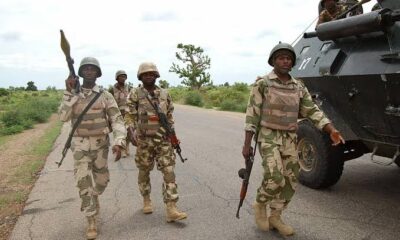

Nigerian troops neutralise 216 terrorists, arrest 332 in one week— Official
The Nigerian Army Defence Headquarters (DHQ) says troops from different operation theaters across the country neutralised 216 terrorists and arrested...


Nigeria loses $9.2 billion to foreign shipowners
A group of maritime experts has revealed that Nigeria loses $9.2bn a year to foreign shipping lines that carry goods...


Nigeria wants managers for proposed $10 billion diaspora fund
A tender paper shows that Nigeria is looking for fund managers for a $10 billion diaspora fund to bring in...


Al Ahly, Esperance to clash in CAF Champions League final
Two of Africa’s club giants, Egypt’s Al Ahly and Esperance of Tunisia, will do battle next month over two legs...


Collabo with Burna Boy enabled me buy house for my mum— Mozambican DJ Tarico
Mozambican disc jockey and sound-producer, DJ Tarico, has credited Nigeria’s Afrobeats sensation, Burna Boy, with his sudden wealth which enabled...


RepAir, Cella partner to launch carbon capture in Kenya
Global Direct Air Capture (DAC) firm, RepAir, has entered into a partnership with carbon storage technology company, Cella, to launch...
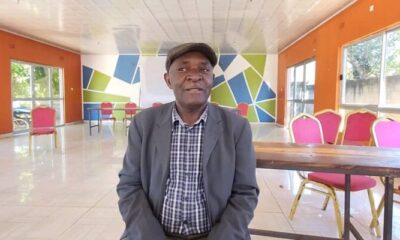

Mapanza traditional council shares positive outlook on media rights, freedom of expression
Jonathan Muchindu, a representative of the Traditional Council of Mapanza Chiefdom in Choma District, Southern Province, Zambia, asserts that the...
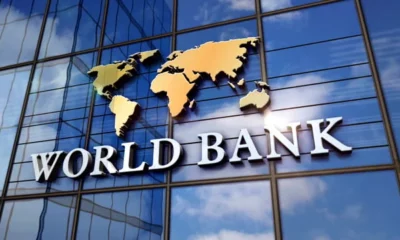

World Bank grants Malawi $57.6 million for food crisis
As a response to its food crisis, the World Bank said on Friday that it would give Malawi $57.6 million...


Nigeria loses N1.29trn annually to crude oil theft, vandalism— Reps Speaker
Speaker of Nigeria’s House of Representatives, Hon. Abbas Tajudeen, has revealed that the country loses a whopping sum of N1.29...
Trending
-

 Sports2 days ago
Sports2 days agoFormer Zambian captain Rainford Kalaba discharged from hospital after near-fatal accident
-

 Tech2 days ago
Tech2 days agoIntel Liftoff Hackathon 2024 calls for applications from African AI startups
-

 Sports21 hours ago
Sports21 hours agoAl Ahly, Esperance to clash in CAF Champions League final
-

 Culture21 hours ago
Culture21 hours agoCollabo with Burna Boy enabled me buy house for my mum— Mozambican DJ Tarico


